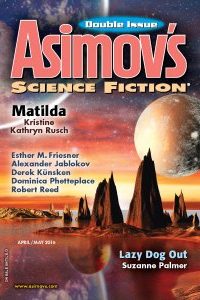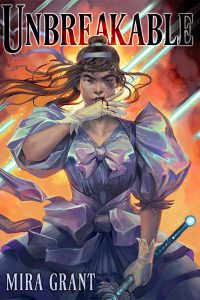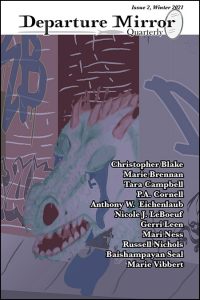Gary K. Wolfe Reviews Into the Riverlands by Nghi Vo
 Into the Riverlands, Nghi Vo (Tordotcom 978-1-25085-142-0, $19.99, 112pp, hc) October 2022.
Into the Riverlands, Nghi Vo (Tordotcom 978-1-25085-142-0, $19.99, 112pp, hc) October 2022.
Into the Riverlands is the third of Nghi Vo’s Singing Hills series of novellas, which began with the Crawford Award-winning The Empress of Salt and Fortune and continued with When the Tiger Came Down the Mountain. All feature the peripatetic cleric Chih from the Singing Hills monastery, sometimes accompanied by their magical hoopoe bird Almost Brilliant. In last year’s Locus interview, Vo said, ‘‘If the Singing Hills stories have a theme it’s that they’re stories about stories: how we tell stories and why we tell stories’’, and this seems to be a fascination that runs deep in all her fiction: The Chosen and the Beautiful is a story that literally takes place inside another story (Fitzgerald’s Gatsby), and Siren Queen explores Hollywood artifice in a number of ways. The characters in Into the Riverlands are equally fascinated by stories, alluding to and often recounting them every chance they get. The overall frame – a disparate group which comes together to share a journey – echoes one of the oldest story-frames there is, from Homer to Chaucer to Wu Cheng-en and others.
The story begins with what seems to me to be a deliberate echo of wuxia tradition: Chih and Almost Brilliant are dining in a local inn when a churlish customer begins bullying one of the servers, and a young woman comes to her rescue with some spectacular martial arts choreography. (Strangers meeting in such a setting, complete with a bullied server, was also the opening of Zen Cho’s The Order of the Pure Moon Reflected in Water, which was part of the Wuxia-storytelling tradition.) That young woman, Wei Jintai, along with her companion Sang, join up with Chih and Almost Brilliant, as do an older couple, Lao Bingri and Mac Khanh, and they all set out for the Betony Docks, where each has some sort of business. Along the way they share tales of the savage Hollow Hand gang of bandits and the legendary martial artist Shaking Earth Master – and make the gruesome discovery of a hanged man, possibly the victim of the gang.
By the time they make it to the docks – where once again they find their martial arts skills challenged in another beautifully choreographed action sequence – we’ve heard interpolated tales or fragments of tales about a girl named Wild Pig Yi, who returned home years after being abandoned in the forest as a baby; the legendary warrior Graivewraith Chen, who becomes her ally; a revenge melodrama called The Cruel Wife of Master See; the Roaring Girl of Whistling Mountain and Princess Shining. As with the first two novellas in the series, especially The Empress of Salt and Fortune, there seems to be a much larger narrative lurking just beneath the surface, as Chih’s world continues to unfold in often unexpected ways. But each of the novellas can serve as an entry point to this world, and each works perfectly well either as a standalone, or as part of an emerging tapestry. Chih and Almost Brilliant are a delightfully engaging pair, and I’d be glad to revisit them anytime.
Gary K. Wolfe is Emeritus Professor of Humanities at Roosevelt University and a reviewer for Locus magazine since 1991. His reviews have been collected in Soundings (BSFA Award 2006; Hugo nominee), Bearings (Hugo nominee 2011), and Sightings (2011), and his Evaporating Genres: Essays on Fantastic Literature (Wesleyan) received the Locus Award in 2012. Earlier books include The Known and the Unknown: The Iconography of Science Fiction (Eaton Award, 1981), Harlan Ellison: The Edge of Forever (with Ellen Weil, 2002), and David Lindsay (1982). For the Library of America, he edited American Science Fiction: Nine Classic Novels of the 1950s in 2012, with a similar set for the 1960s forthcoming. He has received the Pilgrim Award from the Science Fiction Research Association, the Distinguished Scholarship Award from the International Association for the Fantastic in the Arts, and a Special World Fantasy Award for criticism. His 24-lecture series How Great Science Fiction Works appeared from The Great Courses in 2016. He has received six Hugo nominations, two for his reviews collections and four for The Coode Street Podcast, which he has co-hosted with Jonathan Strahan for more than 300 episodes. He lives in Chicago.
This review and more like it in the November 2022 issue of Locus.
 While you are here, please take a moment to support Locus with a one-time or recurring donation. We rely on reader donations to keep the magazine and site going, and would like to keep the site paywall free, but WE NEED YOUR FINANCIAL SUPPORT to continue quality coverage of the science fiction and fantasy field.
While you are here, please take a moment to support Locus with a one-time or recurring donation. We rely on reader donations to keep the magazine and site going, and would like to keep the site paywall free, but WE NEED YOUR FINANCIAL SUPPORT to continue quality coverage of the science fiction and fantasy field.
©Locus Magazine. Copyrighted material may not be republished without permission of LSFF.









I’m sure this was accidental, but the review misgenders Chih, who uses they/them.
Thank you! We’ve corrected it.